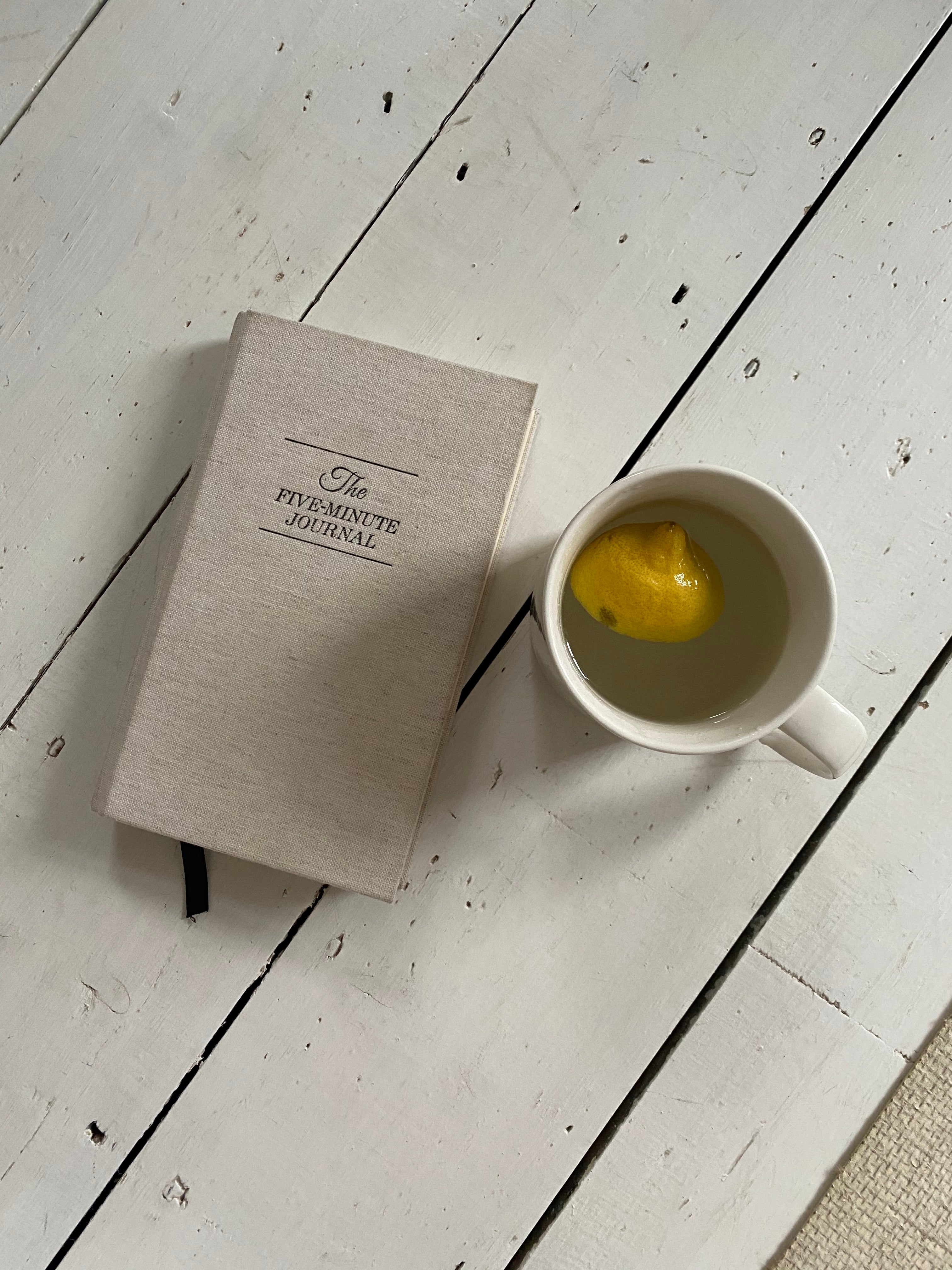How Just 5 Minutes Can Change Your Day
The Transformative Power of Morning Journaling
Finding moments of peace and clarity can seem like a distant dream in the hustle and bustle of our daily lives. For me the morning, before all the world wakes up, is a sacred time to journal, do a short meditation and practise yoga.

Journaling only takes five minutes of this special time. Still, by dedicating to it each morning and setting my goals and intentions, I have experienced profound changes in my mental clarity, productivity, and overall well-being.
But the benefits don’t end there. A night-time journaling session focused on highlights and gratitude can further enhance your day and set you up for a restful sleep.

The Science Behind Morning Journaling:
Morning journaling taps into the power of intention setting and mindfulness.
When you write down your goals and intentions, you engage both your conscious and subconscious mind, creating a clear roadmap for your day.
Studies have shown that setting specific goals increases the likelihood of achieving them.
By starting your day with focused intentions, you set a positive tone and create a sense of purpose.
Benefits of Morning Journaling
1. Enhanced Focus and Clarity:
Writing down your goals and intentions helps declutter your mind. It allows you to identify what truly matters and prioritize tasks accordingly. This practice eliminates the mental fog that often accompanies a busy morning, enabling you to approach your day with a clear and focused mind.
2. Increased Productivity:
When you have a clear set of goals, you are more likely to stay on track and avoid distractions. Morning journaling helps you break down larger tasks into manageable steps, making it easier to accomplish them. This structured approach boosts your productivity and efficiency throughout the day.
3. Stress Reduction:
Journaling serves as a form of emotional release. By putting your thoughts and concerns on paper, you can process and manage stress more effectively. This practice promotes a sense of calm and reduces anxiety, allowing you to start your day with a positive mindset.
4. Improved Self-Awareness:
Morning journaling encourages self-reflection. As you write, you become more attuned to your thoughts, feelings, and motivations. This heightened self-awareness fosters personal growth and helps you make more conscious decisions aligned with your values and goals.
5. Empowerment and Motivation:
Setting intentions and goals in the morning instills a sense of empowerment. It reminds you that you have control over your day and can actively shape your experiences. This empowerment fuels motivation and a proactive attitude, driving you to take meaningful actions towards your aspirations.

How to Start Your Morning Journaling Practice
1. Find a Quiet Space:
Choose a peaceful spot where you won’t be disturbed. This could be a cozy corner of your home, a spot in your garden, or even your favorite chair. For me it’s on my yoga mat with a candle lit.
2. Set a Timer for 5 Minutes:
Not essential but if you are free writing you might want to do this – I use a guided book so rarely go over 5 minutes. Committing to just five minutes makes the practice manageable and easy to integrate into your routine. Use a timer to keep track of time and ensure you don’t feel rushed.
3. Use Prompts if Needed:
If you are unsure where to start, use prompts to guide your writing. Examples include:
- What are my top three priorities for today?
- How do I want to feel today?
- What is one thing I can do to make today meaningful?
4. Write Freely:
Allow your thoughts to flow without judgment. Don’t worry about grammar or structure. The goal is to capture your intentions and goals in a way that feels authentic to you.
5. Review and Reflect:
After writing, take a moment to review what you’ve written. Reflect on how you can incorporate your intentions into your day. This reflection solidifies your goals and helps you internalize them.

Extend the Benefits with Night-Time Journaling
The benefits of journaling extend beyond the morning. A night-time journaling session, focusing on the highlights of your day and practising gratitude, can deepen the positive impact on your life.
Benefits of Night-Time Journaling
1. Enhanced Reflection:
Reflecting on your day helps you gain insights into your experiences, enabling you to learn and grow. It provides an opportunity to acknowledge your achievements and recognize areas for improvement.
2. Improved Sleep Quality:
Expressing gratitude and recounting positive experiences can create a sense of contentment and peace, which is conducive to a good night’s sleep. This practice can help you wind down and transition smoothly into rest.
3. Increased Positivity:
Focusing on the highlights and practicing gratitude shifts your attention to positive aspects of your life. This positive mindset can reduce stress and improve your overall emotional well-being.
4. Strengthened Relationships:
Reflecting on interactions and expressing gratitude for the people in your life fosters a deeper appreciation for your relationships. This can enhance your connections and improve your social well-being.
How to Start Your Night-Time Journaling Practice
1. Find a Calm Space:
Choose a quiet, relaxing spot where you can unwind and reflect without distractions. I tend to do this in bed before I go to sleep as part of my evening routine.
2. Set a Timer for 5 Minutes:
Just like in the morning, dedicating five minutes makes this practice easy to maintain.
3. Use Prompts to Guide You:
If you need inspiration, consider prompts such as:
- What were the highlights of my day?
- What am I grateful for today?
- How did I make progress towards my goals?
- What will I do tomorrow to make it a better day
4. Write Honestly:
Allow yourself to write freely about your experiences and feelings. Authenticity is key to gaining the most from this practice.
5. Review and Appreciate:
After writing, take a moment to review what you’ve written. Appreciate the positive moments and the progress you’ve made. This reinforces the benefits of the practice and sets a positive tone for the following day.

The Easiest Way To Get Started As A Beginner
For those new to journaling, starting with a structured template or journal can make the process easier and more enjoyable. A highly recommended option is the "A Day of Gratitude Journal".
This journal provides prompts and a structured format, making it easy to focus on gratitude, goals, and reflections. It’s designed to streamline the journaling process, requiring just a few minutes each morning and evening, perfect for those with busy schedules.
I hope this was beneficial for you – as always, please reach out if I can help with any questions.

















Comments